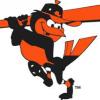The runs saved is better than a run scored is just a micro-example of that. A guy who is worth 15 runs offensively and -10 runs defensively is slightly less valuable than a guy who's worth -10 runs offensively and +15 runs defensively. Team makeup matters a lot there, too.
It's really pretty much equal, though. The difference over 162 games between a .534 and .529 winning percentage is less than a win.
Working this example a little further, I think it'll show how little it matters whether a player "creates" his runs offensively or defensively.
The average run environment last year in the AL was about 8.65 runs per game. That's roughly 700 runs allowed and scored for the average team. Obviously that would be a .500 pythagorean record. Let's say it's a slightly above average team, so they outscore their opponents by 20 runs, 10 created and 10 saved, so they are 710 scored and 690 allowed. That's a .5143 pythagorean record, or 83.31 wins.
So say that same team had a LF who was exactly league average offensively and defensively. Let's then replace that guy with someone who's +10 offensively but -10 defensively. So instead of scoring 710 and allowing 690, they score 720 and allow 700. That's a .5141 winning percentage, or 83.28 wins.
Let's also consider replacing him with a guy who's -10 offensively but +10 runs defensively. So instead of 710 and 690, they are now at 700 and 680. That's a .5145 winning percentage, or 83.35 wins.
So you're slightly worse off if you replace a neutral player with someone who's offensively minded but gives it all back defensively. And slightly better off if you replace that guy with someone who has a good glove but gives it all back offensively. It's a very minute difference though. I think it's very fair to say that a run saved is equally as valuable as a run created.




























































































































































